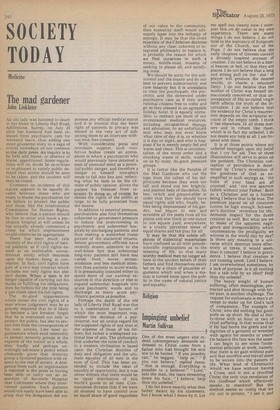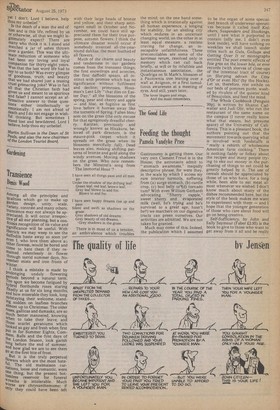Religion
Impinging unbelief
Martin Sullivan
One of the most urgent and indeed contemporary demands addressed to Christ came from a father who had brought his sick son to be healed. "If you possibly can," he begged, help us." "If you can believe," replied Jesus, " that is enough. Everything is possible to a believer." "Lord," said the man, the tears streaming down his face, "I believe; help thou my unbelief."
I do not know exactly what that father meant by his statement, but I know what I mean b it L t
y . e me spell out clearly how I interpret this cri de coeur in my own experience. There are many things I do not believe. I do not hold to the inerrancy of Scripture, nor of the Church, nor of the Pope. I do not believe that the early chapters of Genesis contain a divinely inspired account Of creation. I do not believe in a literal heaven or hell, or that they are places. I do not believe that a long and strong pull on the 'slot' of prayer will produce the desired results, or charm a reluctant Deity. I do not believe that the mother of Christ was herself immaculately conceived, or that unacceptance of His so-called virgin birth affects the truth of the Incarnation. I do not believe that the evidence for Christ's resurrection depends on the scriptural account of the empty tomb. I think it lies elsewhere. In all these matters and in others like them, which is in fact my unbelief, I do not desire any help at all. I am finished with them. It is at those points where my unbelief impinges upon my belief that I cry for aid. Two or three illustrations will serve to point up the problem. The Christian conception of providence is determined by Christ's revelation of the goodness of God as exemplified in such sayings as, 'the hairs of your head are all counted,' and 'not one sparrow falleth without your Father.' Both as a Christian and as a human being I believe that to be true. The premium placed on all creatures cannot be high enough. Schweitzer's doctrine ' reverence for life,' demands respect for the dumb creation as well. But what are we to make of the apparent negli-, gence and irresponsibility which countenances the prodigality we witness in the world day by day.? Is there .any meaning to a universe which destroys more effectively at times, it would seem, than it creates? I believe in providence. I believe that creation is not running amok. Lord believe. I am overwhelmed sometimes, by a lack of purpose. Is it all nothing, but a tale told by an idiot? Help thou my unbelief, The heavy weight of human suffering, often meaningless, protracted and shot through with bitter pain, is another challenge. The request for euthanasia is man's attempt to make up for God's lack of compassion. The example of 'Christ, who did nothing but good, pulls us up short. He died at thirty-three with an hour or two of cruel suffering. Is that worse than if He had borne the griefs and indignities of a geriatric or wrestled with agony for months or years? On balance His fate was the same. I can begin to see some fundamental principle at work, namely, that there is no gain without pain and that sacrifice and travail seem to be woven into the pattern of life. What kind of Christianity would we have without having a Cross, and is not a crucified Christ the only true revelation of the Godhead which effectively speaks to mankind? But the method seems so costly that we cry out in, .protest, "I see it and
Yet I don't. Lord I believe, help thou my unbelief." Is the death of a man the end of him and is this life, refined by us ot otherwise, all that we might legitimately expect? There are many who think it is. I stood arid watched a jar of ashes thrown over a garden. This was the ultimate reduction of someone who had been my loving and loyal companion for thirty-eight years. Was that the last word life had to say to us both? Was every glimpse of goodness, truth, and beauty that we had shared just a teasing cruel grimacing joke? Was in fact all that the Christian faith had given us and meant to us spurious and false? I cannot accept an affirmative answer to these questions either intellectually or emotionally. I am not afraid of death and I do not engage in wishful thinking. But sometimes I stand lost and bewildered. Lord I believe, help thou my unbelief.
Martin Sullivan is the Dean of St Pau's, and also the new chairman of the London Tourist Board.



































 Previous page
Previous page